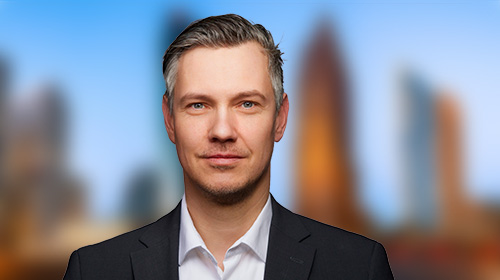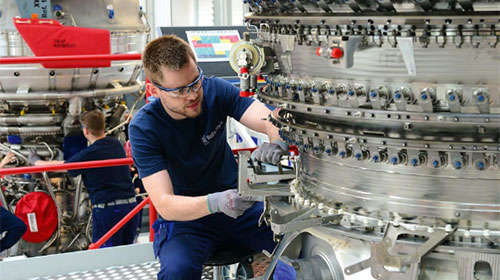Berlin Aerospace Center
The aerospace industry is one of the capital region's most important future industries. It combines a high level of innovation with sophisticated technology.
The capital region ranks among the three most important locations for aerospace technology in Germany. With global players such as Planet Labs, Rolls-Royce and MTU, world-renowned aerospace companies are in the region. In their environment there are many opportunities for small and medium-sized enterprises as suppliers or in the service, security, or IT sectors. They all benefit from exceptionally high scientific and research potential in the capital region.
Facts and figures
- About 7,500 specialists, technicians and engineers work for aerospace companies in the capital region
- Approximately 17,000 employees work in the aviation industry
- Venue of the Innovation and Leadership in Aerospace Berlin (ILA), the third largest trade fair in the world in this segment, and one of the highest-selling
- Optimal networking in and with the regional aerospace industry via the Berlin-Brandenburg Aerospace Alliance (BBAA)
- Regional core competencies of the companies in satellite technologies, propulsion technology, maintenance, overhaul and repair (aircraft maintenance), simulation, testing, engineering and software development as well as the design of urban airspace (UAM)
Competence center for space technologies and New Space
Civilian unmanned aircraft systems have been added as a new category. Over 60 stakeholders from the fields of research (e.g. DAI Laboratory, European Aviation Security Center), development, and industry participated in the project. the European Aviation Security Center, development (e.g. Multirotor Beteiligungsgesellschaft mbH, Multirotor Beteiligungsgesellschaft mbH, BearDrones) and application (e.g. Airteam) are developing the capital region into a leading location for unmanned flight. Model projects such as the transport of laboratory samples and medicines at Berlin's Charité hospital are opening up urban airspace.
Regional drone technologies conquer the market
Civil unmanned aerial systems have recently been added to the established activities. Here there is great deal of momentum in terms of applications and services. More than 60 players from the field of research (e.g. DAI Labor, the European Aviation Security Center), development (e.g. germandrones GmbH, Multirotor Beteiligungsgesellschaft mbH, BärDrones), and application (e.g. Airteam) are helping to make the capital region a leading unmanned flying location. Urban airspace is being utilised by model projects such as the transport of laboratory samples and medicines on the premises of the Berlin Charité.
Research environment
Companies and suppliers in the aerospace industry benefit from the expertise of a strong regional research network:
- TU Technical University of Berlin (Raumfahrttechnik, Logistics, Mechanical Engineering and Transport Systems)
- Brandenburg University of Technology Cottbus–Senftenberg
(Brandenburgische Technische Universität Cottbus-Senftenberg - BTU) - Wildau Technical University of Applied Sciences
(Technische Hochschule Wildau) - Brandenburg University of Applied Sciences
(TH Brandenburg a. d. Havel) - Fraunhofer Institute IAP - Polymercomposites PYCO
- Fraunhofer Institute for Production Systems and Design Technology
(Fraunhofer Institut für Produktionsanlagen und Konstruktionstechnik - IPK) - BHT Berliner Hochschule für Technik
- Embry-Riddle Aeronautical University
- European Aviation Security Center EASC e.V.
- Federal Institute for Materials Research and Testing
(Bundesanstalt für Materialforschung und Prüfung - BAM) - German Aerospace Center
(Deutsches Zentrum für Luft- und Raumfahrt e.V. - DLR) - GFZ Helmholtz Centre for Geosciences
(GFZ Helmholtz-Zentrum für Geoforschung) - HU Humboldt-Universität zu Berlin
- FBH Ferdinand-Braun-Institut
The TU Berlin established Germany's first chair for space technology in 1963 and is now one of the most renowned institutions worldwide – and the university with the most satellites in orbit.
The Fraunhofer Institutes and the German Aerospace Center (DLR) in Berlin undertake research and development contracts from regional industry.
The University of Potsdam operates a research center for public law, media law, and air and space law.
The DLR mission MERTIS is mapping Mercury's temperatures. The PLATO space telescope has been on its way to Mercury since 2018 under Berlin's leadership to measure the atmospheres of planets outside our solar system. In 2020, several instruments were tested on Venus during a flyby.





